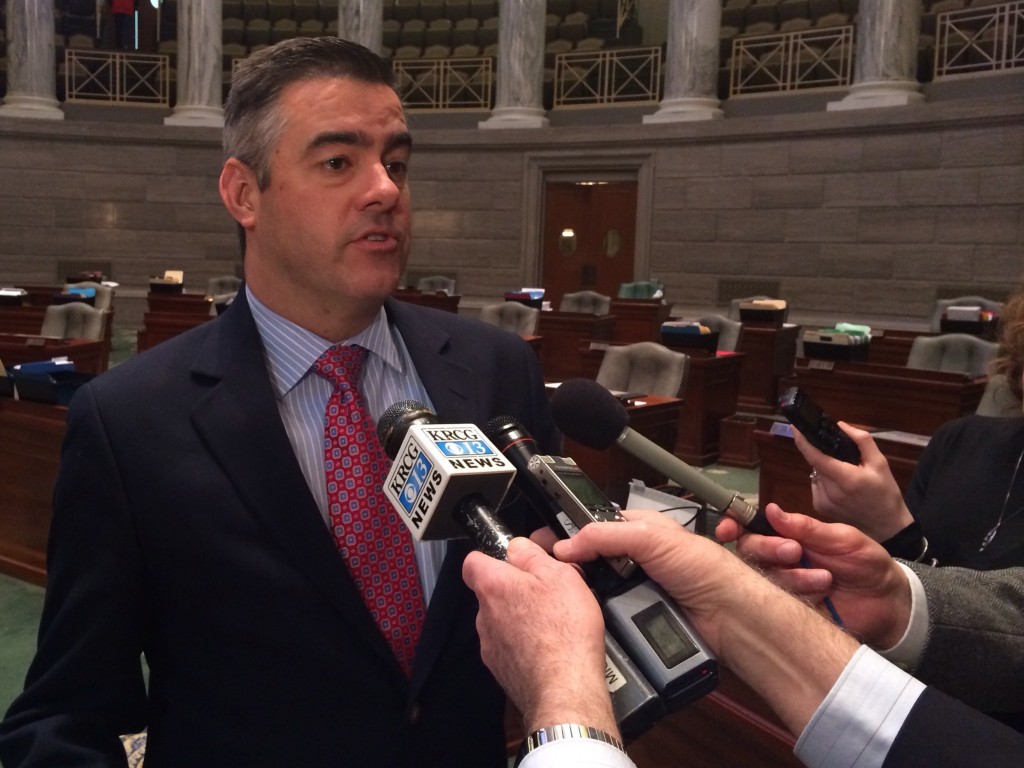
Senate President Pro Tem Tom Dempsey, R-St. Charles. (PoliticMo Photo)
The legislature as a whole placed just six bills on the governor’s desk, but each chamber moved forward their own, individual priorities.
Senate
Senate President Pro Tem Tom Dempsey, R-St. Charles, said the Senate was most proud of its efforts on education policy to address the school transfer crisis facing urban and suburban St. Louis. The body passed legislation aiming to allow schools to be accredited individually instead of only by school district and require failing unaccredited districts – defined by 55 percent failing schools – to pay much of the tuition costs for students to attend neighboring school districts.
“We passed the most substantive eduction bill in 20 years in the Senate,” he said.
Moving into the second half of session, Dempsey said, a great deal of time is likely to be given to the joint effort of Sen. Jolie Justus, D-Kansas City, and Sen. Bob Dixon, R-Springfield, to reform the state’s criminal code. The Senate spent several hours on Tuesday and Wednesday studying the bill on the floor and the two Senators listened to members’ concerns in hopes of offering a floor substitute and starting debate when they return from break.
Dempsey said the biggest problem with the bill so far is its size, as well as lack of assurance from Gov. Jay Nixon’s office that he will actually sign it.
“It’s an area where not a lot of us have experience. We’re very concerned about the repercussions if we do something wrong,” he said. “We don’t know whether the governor will sign it or where the top prosecutor is on the bill.”
House
House Speaker Tim Jones, who campaigned the state earlier this year touting his “4G” legislative agenda (“growth and opportunity for all Missourians, guaranteeing access to a great education, generating affordable and abundant energy, and guarding and protecting Missouri values”), said the legislature moved on several of those priorities.
While the House moved forward on many anti-abortion bills, Jones said perhaps its biggest accomplishment in the first nine weeks was on the “growth” component. He pointed to bills that change the state’s tax policy, cap state tax credits, address the economic “border war” with Kansas, and bills that would cap the price tag on medical malpractice lawsuits.
When they return, Jones said they would likely take up the education and school transfer issue – possibly the Senate bill – when they return from break.
“I would like to move a bill on that to the governors desk,” he said.
Right to Work
The House has yet to make significant movement on labor policy, a chief priority of Jones during his final year in office. The body met in caucus on Wednesday to discuss legislation that would require annual consent from union members for their dues to go to political purposes, but they could not come to agreement. The House has also stalled on ‘right to work’, but Jones said he hopes to get it on the floor calendar when they return from break.
“I would like to see worker freedom and choice,” he said. “It truly is worker freedom and choice.”
Tax disagreement?
The two chambers are seemingly divided over how to move forward on tax policy. In the Senate, members have made the decision to address tax credit reform – a major sticking point within the Republican caucus – first, and tax cuts second. Sen. Will Kraus, a Kansas City Republican who announced a tax cut deal supported by Nixon, a Democrat, was unable to build support for his package.
“There continues to be different philosophies with the best way to move a bill,” Dempsey said. “We’re pursing our tax policy to help problems at home and address competition with other states.”
Dempsey said the Kraus-Nixon package was essentially a “tax cut in name only,” and that he and other Republicans wanted to put a stronger package on Nixon’s desk. Jones has said he opposed coupling tax credit reform with the tax cut issue, but that he did not want to interfere with Senate Republican negotiations.
“We’ve sent them three vehicles reforming taxes,” Jones said. “I think our caucus wants to pass a tax reduction bill.”
Lawmakers are set to return to Jefferson City on March 24, with seven weeks remaining in session.
